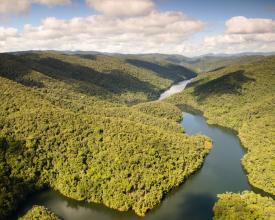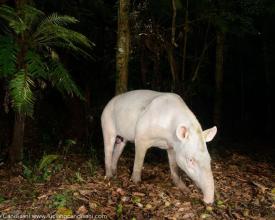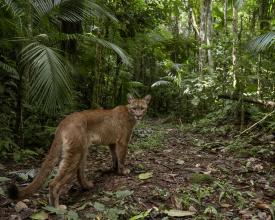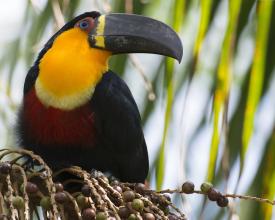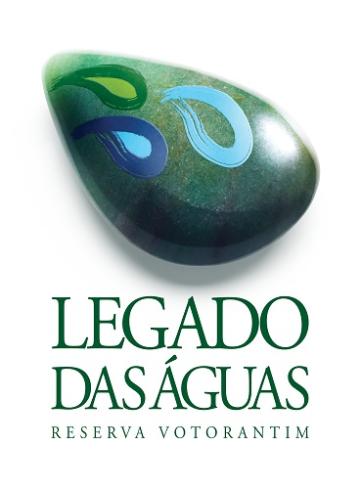
Legado das Águas - Reserva Votorantim (Water Legacy)
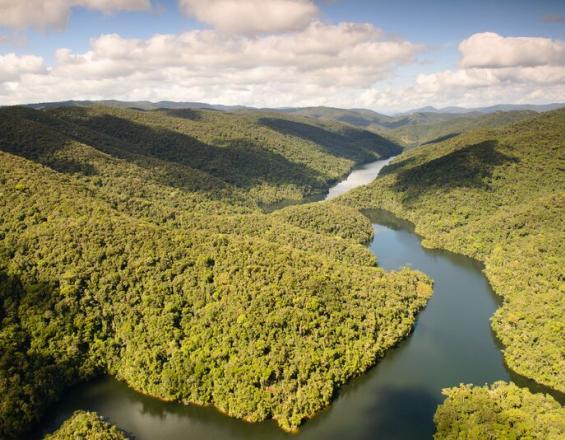
The Legado das Águas (Water Legacy), the largest private reserve of the Brazil's Atlantic Forest, with 31,000 hectares, is one of Votorantim Company's environmental assets. Located in the Vale do Ribeira region in the south of the São Paulo State, the area was acquired in the 1940s and has since been conserved with the objective of guaranteeing, in the long term, the water resource of the Juquiá River water basin.
Today, Legado das Águas is managed by the company Reservas Votorantim LTDA, created to establish and implement a new model of environmental asset management.
In this sense, the Legado das Águas was structured in such a way as to promote actions within four central axes: Institutional Management, Human and Social Capital, Economic Capital and Natural Capital, demonstrating that the sustainable use of the natural resources of private protected areas makes possible the investiment in the maintenance of the area, as well as social and economic benefits.
Contexte
Challenges addressed
One of the barriers imposed on the Legado das Águas is its non-recognition as a voluntary initiative (but rather environmental compensation).
Among the other barriers found by the Reserve, there are five priorities:
- Political issues that still permeate processes and relationships with key actors (social challenge);
- Difficulty of engaging everyone in pursuit of the same goals (social challenge);
- Scope of the financial balance between the amount invested and the income obtained (economic challenge);
- Investment for maintenance of all programs and projects in subsequent years (economic challenge); and
- Inhibit the presence of invaders (Juçara palm trees and animals hunters) (social and environmental challenge).
Emplacement
Traiter
Summary of the process
The Protocol of Intentions signed with the Government of the State of São Paulo establishes a shared management model. Therefore, the Legado das Águas must report its actions, works and results achieved throughout each year. This report has the effect of informing the government that what has been promised is being fulfilled. In this sense, the Strategic Management Plan is essential, since it directs all decisions and actions promoting the results that are reported and demonstrate the efforts made in the innovative management of the Legado das Águas for the generation of shared value between forest, territory and enterprise .
Building Blocks
Protocol of Intentions
In 2012, the Legado das Águas was recognized as a Private Sustainable Development Reserve (PSDR) through a partnership with the State Government of São Paulo. Since then, Votorantim S.A. has signed a protocol of intentions, where it undertakes to protect the area that forms the Legado das Águas . Among the terms signed in the agreement is the proposal of shared management between Votorantim Reserves LTDA and the Government of the State of São Paulo, facilitating advances in scientific studies, environmental education, public use, protection of endangered species, socioeconomic development of the region and, mainly , forest conservation.
The objective of this partnership is to strengthen the work developed in the Legado das Águas and to recognize the importance of the area for the conservation of Brazilian biodiversity by the public power.
Enabling factors
In order to celebrate this protocol by both stakeholders, it is necessary that the document describes the importance of conservation of the area to ensure the survival of biodiversity and the various benefits generated by the services provided by the area, both local, regional and global.
Lesson learned
The engagement of the public power is an essential element for the consensus in the celebration of the protocol of intentions. However, this commitment is due to the understanding of the new model of management of private protected areas, associated with the understanding of the objectives that guide the actions of the company, in the case of Reservas Votorantim LTDA, and how these objectives are in synergy with the needs of the power public.
Resources
Strategic Management Plan
Between 2012 and 2014, the Strategic Management Plan was developed in partnership with CI - Conservation International, document that defines the objective and the management strategy of Legado das Águas, covering the business plan and the management plan in a single document . Divided into three volumes - Diagnosis; Zoning; Development Strategies and Programs - The Strategic Plan guides all actions towards the core objectives. In this sense, progress has been made with regard to social performance with the implementation of organizational structuring programs and training in the territory in which the Legado das Águas is inserted, as well as the opening of the area for ecotourism activities and the development of a scientific research center conservation of biodiversity.
Enabling factors
In order to prepare a document of the size of the Strategic Management Plan, an extensive investment in research to recognize the area, fauna and flora is essential. In addition, understanding the culture and context, both social and political, in which the Legado das Águas is inserted is a necessary guideline to ensure the company's survival and engagement of all stakeholders. It is worth mentioning that a thorough and detailed market study is more than essential for the strategy to be effective.
Lesson learned
The Strategic Management Plan must be aligned with the reality of the business, since its use is not only for consultation, but as a guiding action for the business.
Another important fact is the engagement of all stakeholders for the participatory construction of the strategic management plan.
Impacts
The Legado das Águas (Water Legacy) is the largest private reserve of Atlantic Forest in the country and contributes to the effectiveness of the largest continuous corridor of this biome; All Reserve activities generate positive externalities for the territory, for the forest and for the people. At meetings and events, the reserve stands as an initiative to protect the standing forest and ecosystem services. In addition, in activities developed for external audiences actions are applied that contribute to the debate about the need and importance of conservation, seeking the engagement of this public.
It is also the focus of the Legado das Águas to contribute to the development of the Vale do Ribeiro. The work of the reserve in the municipalities has as driver the generation of value. Thus, the Legacy invests in programs for the structuring of municipal governments, community strengthening and education improvement. These actions aim to harmonize the protection of the forest, the strengthening of society and the activities of the new economy.
Beneficiaries
Public organizations and municipal councils related to the tourism, education, agriculture and environment; local entrepreneurs of
accommodation means and food production; directors and pedagogical coordinators of educational networks.
Sustainable Development Goals
Story
The Vale do Ribeira, where the Legado das Águas is inserted, has the largest continuous area of preserved Atlantic Forest in Brazil. However, on the other hand, it also has an Human Development Index (HDI) score below the national average and the worst in the State of São Paulo. This fact exacerbates other existing problems, such as deforestation, palm trees and hunting.
The presence of Votorantim S.A. in the Vale do Ribeira was initiated with the construction of the Juquiá Complex hydroelectric plants, accompanied by a series of acquisitions of areas with vegetation cover on the banks of the Juquiá River. These areas, second the vision of the company's leadership, were essential for the perenniality of the river.
The set of areas acquired over the years made possible the creation of the Legado das Águas , the largest private reserve of the Brazilian Atlantic Forest, with 31,000 hectares of vegetation at an advanced stage of conservation. Structured on the ideology of the new economy, the Legacy promotes actions within four central axes, Institutional Management, Natural Capital, Human-Social and Economic Capital, aiming to contribute to the development of the region, generating revenue for the company and, mainly, keeping the forest standing.
In this sense, the Legado das Águas has actively contributed to economic development, based on the principle of sustainability, and socio-political engagement in the Vale do Ribeira.
From a deeper perspective, theLegado das Águas was present in the construction of legal landmarks essential for the territorial development of the municipalities in which it is inserted. As an example, we can cite the Tapiraí Master Plan, the Regional Integrated Tourism Plan and the Basic Sanitation Plans for Juquiá and Miracatu.
These results are the fruit of the work undertaken by the various programs implemented by the Reserve in partnership with the public power, society and institutions, namely: AGP (Support for Public Management), PVE (Votorantim Program for Education), ReDes (Networks for Sustainable Development ); in partnership with BNDES, and Community Participation and Entrepreneurship.
In addition, the Legado das Águas , through its performance and purpose, proved to be an important pole of scientific studies applied to conservation. To date, more than 1,700 species of fauna and flora have been identified as a result of the partnerships established by the Reserve to raise awareness of the importance of biodiversity.

